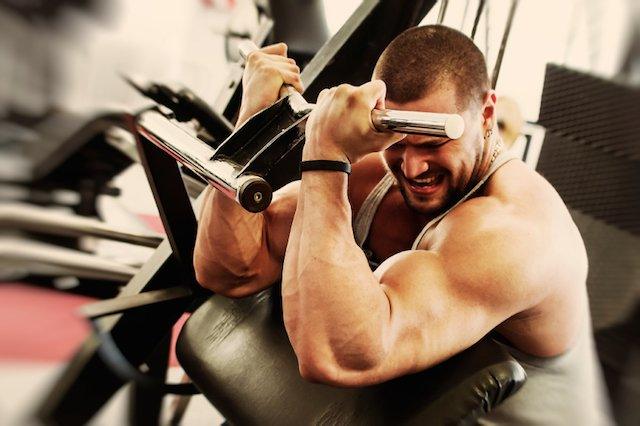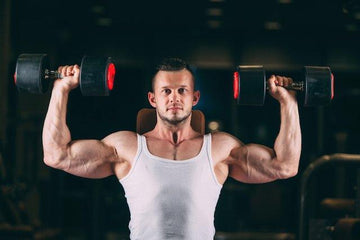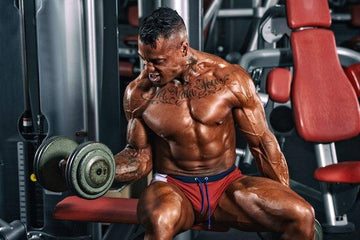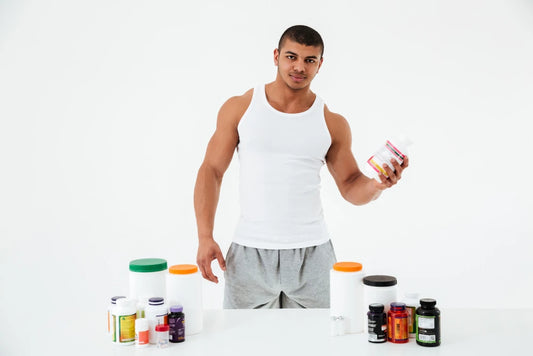

Bigger Gains by Reducing Training Volume
Table of Contents
Bigger Gains by Reducing Training Volume
by: Robbie Durand
15% Increase in Testosterone Associated with Reduced Training Volume
If you look on the internet, there are people that claim that you can’t overtrain from resistance exercise and that it’s all a myth. There is not much data performed in resistance training and whether overtraining is really possible for a lifter. It’s been well established that events requiring large training volume such as that involved with aerobic exercise can result in decreases in anabolic hormones. For example, research has reported that individuals participating in endurance training for many hours at a time have been shown to have an overactive pituitary gland, which may result in increased levels of cortisol and a disruption in muscle growth. Research suggests that excessive training volumes usually produce a reduction between the testosterone-to-cortisol ratio, which may lead to performance declines. This ratio is believed to show the balance of action between anabolic and catabolic activity. Contrary to this, most lifters are done with their workout in an hour, so is it truly possible to overtraining with such a low training volume. There are many exercise physiologists that believe that most lifters are never overtrained. The two principle factors that induce overtraining are training volume and intensity. A lifter should not train the same year round; periods of reduced training volume is important for improved anabolic to catabolic levels of hormones.
 Changing Your Training Volume Essential for Testosterone
Changing Your Training Volume Essential for Testosterone
All lifters should be rotating their volume, sets, repetitions, rest period between sets, ect. The newest study published in the Frontiers in Physiology that if your training program is well planned, you won’t have any decreases in anabolic hormones. The study aimed to compare the response of salivary hormones of track and field athletes induced by preparation and pre-competitive training periods in an attempt to comment on the physiological effects consistent with the responses of each of the salivary testosterone, cortisol, and markers of immune function, and mood state at rest in 24 world-class level athletes during preparation (3 times in 3 months) and pre-competitive (5 times in 5 weeks) training periods.
All participating athletes were followed throughout a 20 week (i.e., 4.5 months) period prior to the major international competitions The follow-up was spread over two main periods:
-a preparation period of 3 months (PREP), characterized by a high training volume, and
-a pre-competitive period (COMP) of 1.5 month including high-intensity and specific training, with a reduced training volume.

There was no major decline in salivary testosterone concentration during the entire training season. During the preparation period, testosterone was 405.5 vs. 409.6 during the competitive season. Although training load and psychological perception of fatigue were lower in the pre-competitive period than in the preparation period in our study, testosterone concentration was similar in both phases. The most interesting finding was that salivary testosterone which has been reported to be related to the training level. A significant increase in salivary testosterone (+9 to +15%) and a decrease in testosterone/cortisol ratio were associated with a progressive reduction in training load during pre-competitive period. Interesting during the pre-competitive season, while the training volume was the highest, the anger, depression, and fatigue levels were the highest, yet there was no reduction in testosterone. This should make lifters question is feelings of fatigue are truly a good indicator of overtraining as testosterone levels were not reduced despite the bad feelings of the athletes.
When training volume was reduced as the competition season approached, it was associated with a reduced fatigue perception as shown by the lower level of tension, depression, anger, confusion, and total mood disturbance in pre-competitive in comparison with the preparation period which volume was the highest.
Key Points: Bodybuilders should have periods where they reduce their training volume to boost anabolic hormones and refresh their mental outlook for training in the gym.
Guilhem G, Hanon C, Gendreau N, Bonneau D, Guével A, Chennaoui M. Salivary Hormones Response to Preparation and Pre-competitive Training of World-class Level Athletes. Front Physiol. 2015 Nov 16;6:333.
D’souza D. (1994). Track and field athletics injuries—a one-year survey. Br. J. Sports Med. 28, 197–202. 10.1136/bjsm.28.3.197
Faude O., Meyer T., Scharhag J., Weins F., Urhausen A., Kindermann W. (2008). Volume vs. intensity in the training of competitive swimmers. Int. J. Sports Med. 29, 906–912.
Cook C. J., Crewther B. T., Kilduff L. P. (2013). Are free testosterone and cortisol concentrations associated with training motivation in elite male athletes? Psychol. Sport Exerc. 14, 882–885.
Ahtiainen JP, Lehti M, Hulmi JJ, Kraemer WJ, Alen M, Nyman K, Selänne H, Pakarinen A, Komulainen J, Kovanen V, Mero AA, Häkkinen K. Recovery after heavy resistance exercise and skeletal muscle androgen receptor and insulin-like growth factor-I isoform expression in strength trained men. J Strength Cond Res. 2011 Mar;25(3):767-77.
Ching-Lin Wu, Wei Hung, Shin-Yuan Wang, Chen-Kang. Chang. Hormonal responses in heavy training and recovery periods in an elite male weightlifter.Journal of Sports Science and Medicine (2008) 7, 560 – 561
Nieman, DC. Effects of athletic endurance training on infection rates and immunity. In: Kreider, RB, Fry, AC, O’Toole, ML (Eds.), Overtraining in Sport. Champaign, IL: Human Kinetics; 1998.
Fry, A.C. The role of training intensity in resistance exercise overtraining and overreaching. In: Overtraining in Sport. Champaign, Illinois: Human Kinetics. 1998. 107–127.

















